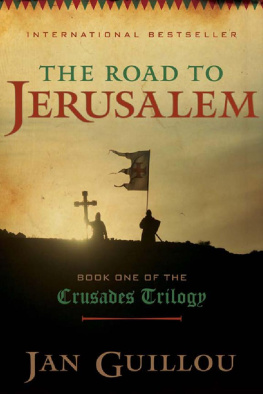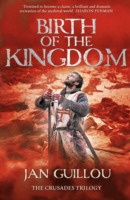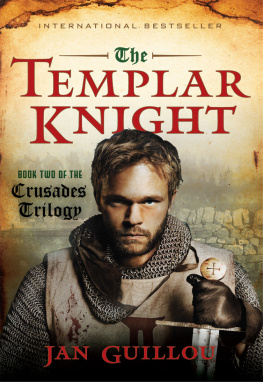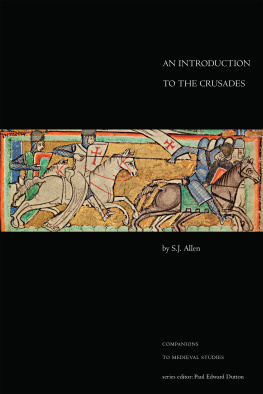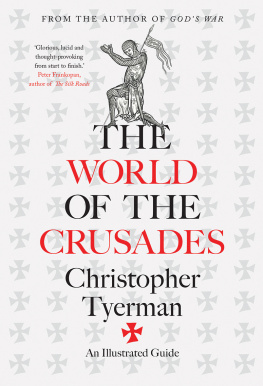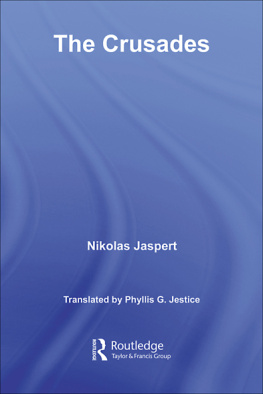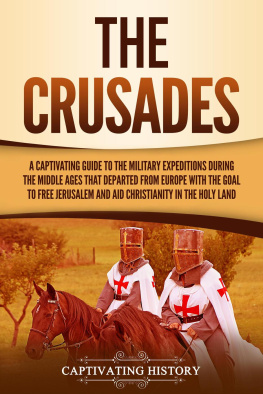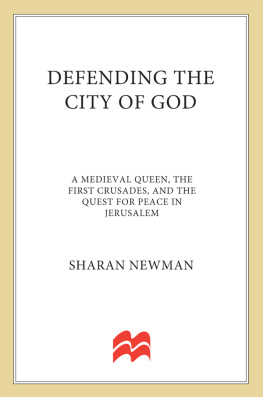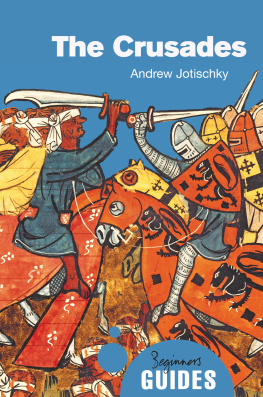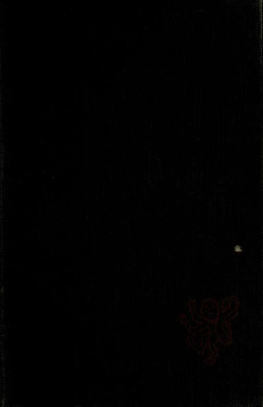The Road to
Jerusalem
b o o k o n e o f t h e
Crusades Trilogy
JAN GUILLOU
Translated from the Swedish by Steven T. Murray

The road to hell is paved with good intentions.
george herbert, Jacula Prudentum, no. 170, 1651
Cast of Primary Characters
the folkung clan (including the bj

lbo branch)
Magnus Folkesson, master of Arns
Fru Sigrid, first wife of Magnus Folkesson and mother of Eskil and Arn
Erika Joarsdotter, second wife of Magnus Folkesson
Eskil Magnusson, first son of Magnus Folkesson
Arn Magnusson, second son of Magnus Folkesson
Birger Brosa, younger brother of Magnus Folkesson
the erik clan
King Erik Jedvardsson, king of Svealand
Joar Jedvardsson, brother of Erik Jedvardsson
Kristina Jedvardsson, wife of Erik Jedvardsson (and kinswoman to Fru Sigrid)
King Knut Eriksson, son of Erik Jedvardsson
the sverker clan
King Sverker, king of Eastern Gtaland
Queen Ulvhild, first wife of King Sverker
King Karl Sverkersson, son of King Sverker and Ulvhild Rikissa, second wife of King Sverker
Knut Magnusson, son from Rikissa's first marriage, later king of Denmark
Emund Ulvbane (aka "Emund One-Hand")
Boleslav and Kol, half brothers of King Karl Sverkersson the p l clan
Algot Plsson, steward of Husaby
Katarina Algotsdotter, older daughter of Algot
Cecilia Algotsdotter, younger daughter of Algot
the clergy (cistercians from france)
Father Henri de Clairvaux, prior of Varnhem
Brother Guilbert de Beaune, the weapons smith
Brother Lucien de Clairvaux, the gardener
Brother Guy le Breton, the fisherman
Brother Ludwig de Btecourt, the music master
Brother Rugiero de Nmes, the chef
Archbishop Stphan
the danes
King Sven Grate of Denmark
Magnus Henriksen, the king-slayer
Chapter 1
In the year of Grace 1150, when the ungodly Saracens, the scum of the earth and the vanguard of the Antichrist, inflicted many defeats on our forces in the Holy Land, the Holy Spirit descended upon Fru Sigrid and gave her a vision which changed her life.
Perhaps it could also be said that this vision had the effect of shortening her life. What is certain is that she was never the same again. Less certain is what the monk Thibaud wrote much later, that at the very moment the Holy Spirit revealed itself to Sigrid of Arns, a new realm was actually created up in the North, which at the end of the era would come to be known as Sweden.
It was at the Feast of St. Tiburtius, the day regarded as the first day of summer, when the ice melts in Western Gtaland. Never before had so many people gathered in Skara, since it was no ordinary mass that was now to be celebrated. The new cathedral was going to be consecrated.
The ceremonies were already into their second hour. The procession had made its three circuits around the church, moving with infinite slowness because Bishop dgrim was a very old man, shuffling along as if it were his last journey. He also seemed a bit confused, because he had read the first prayer inside the blessed church in the vernacular instead of in Latin:
God, Thou who invisibly preserveth everythingbut maketh Thy power visible for the salvationof humanity,
take Thy house and rule in this temple,
so that all who gather here to pray
might share in Thy solace and aid.
And God did indeed make His power visible, though whether for the salvation of humanity or for other reasons is unknown. It was a pageant like none ever seen before in all of Western Gtaland: there were dazzling colors from the vestments of the bishops in light-blue and dark-red silk with gold thread, there were overpowering fragrances from the censers which the canons swung as they walked about, and there was a music so heavenly that no ear in Western Gtaland could ever have heard its like before. And if you raised your eyes it was like looking up into Heaven itself, but under a roof. It was inconceivable that even the Burgundian and English stonemasons could have created such a high vault that would not come crashing down, if for no other reason than that God might be angry at the vanity of attempting to build an edifice that could reach up to Him.
Fru Sigrid was a practical woman. Because of this some people said that she was a hard woman. She had absolutely not wanted to set off on the difficult journey to Skara, since spring had come early and the roads had softened to a sea of mud. She was uneasy at the thought of sitting in a wagon that jolted and bounced and careened back and forth, in her blessed condi tion. More than anything else in this earthly life, she feared the coming birth of her second child. And she knew very well that if a cathedral was being consecrated, it would mean standing on the hard stone floor for several hours and falling to her knees repeatedly in prayer. She was well versed in the many rules of church life, surely far better than most of the noblemen and their daughters surrounding her just now, but she had not acquired this knowledge through faith or free will. When she was sixteen years old her father, with good reason, took it into his head that she was paying too much attention to a kinsman from Norway of far too low birth, which might have led to something that belonged only within the sacrament of marriage, as her father gruffly summed up the problem. So she had been sent away for five years to a convent in Norway. She probably never would have been released if she hadn't come into an inheritance from a childless uncle in Eastern Gtaland; thus she became a woman to be married off instead of languishing in a convent.
So she knew when to stand and when to kneel, when to rattle off the Pater Nosters and Ave Marias which some of the bishops at the altar were intoning, and when to say her own prayers. Each time she had to say her own prayer, she prayed for her life.
God had given her a son three years before. It had taken two days and nights to give birth to him; twice the sun had gone up and gone down again while she was bathed in sweat, anguish, and pain. She knew she was going to die, and in the end all the good women helping her knew it too. They had sent for the priest in Forshem, and he had given her extreme unction and forgiveness for her sins.
Never again, she had hoped. Never again such pain, such terror of death, she now prayed. It was a selfish thing to ask, she knew that. It was common for women to die in childbed, and a human being is born in pain. But she had made the mistake of praying to the Holy Virgin to spare her, and she had tried to fulfill her marital duties in such a way that they would not lead to another childbed. Their son, Eskil, had lived after all.
The Holy Virgin had punished her, of course. New torments now awaited her, that was certain. And yet she prayed over and over to come through it easily.
To lighten the lesser but irksome nuisance of standing and kneeling, standing up and then kneeling down again, for hours on end, she'd had her thrall woman Sot baptized so that she could come along into God's house. She had Sot stand next to her, and she leaned on the thrall when she had to get up and down. Sot's big black eyes were open wide like terrified horse's eyes, staring at everything she now observed. If she wasn't a real Christian before then she ought to have become one by now.

 lbo branch)
lbo branch)
